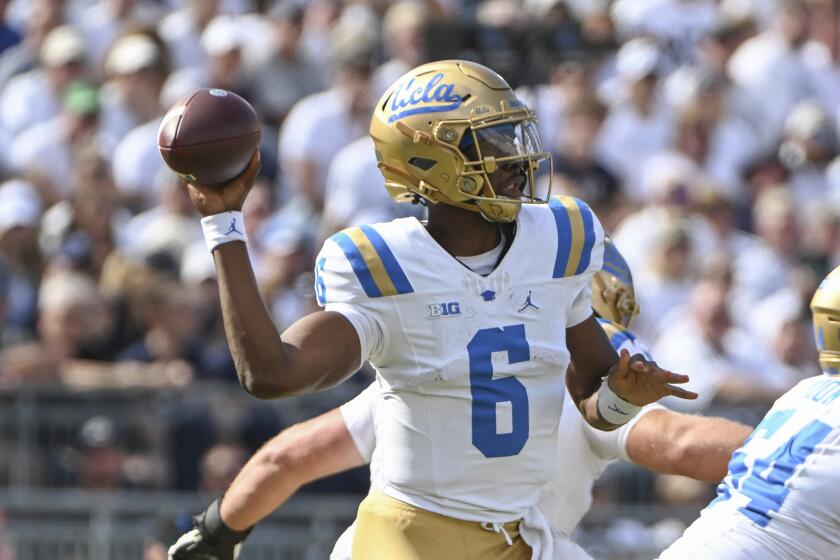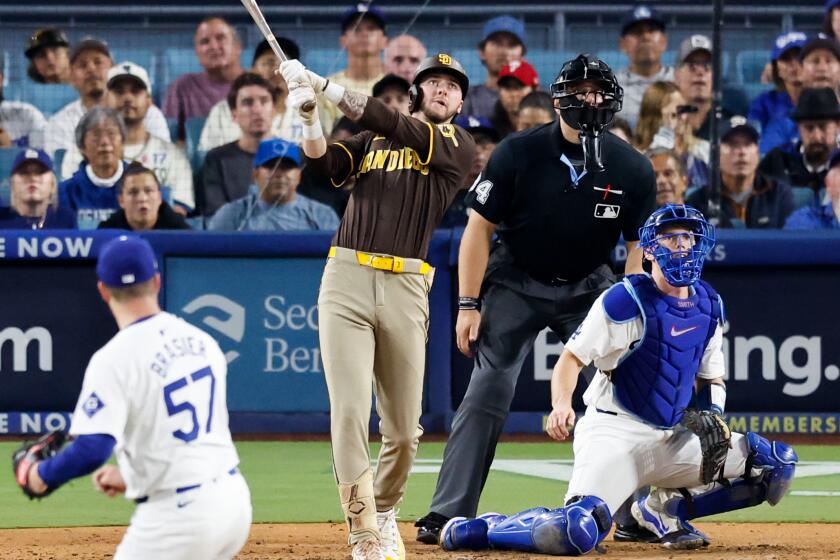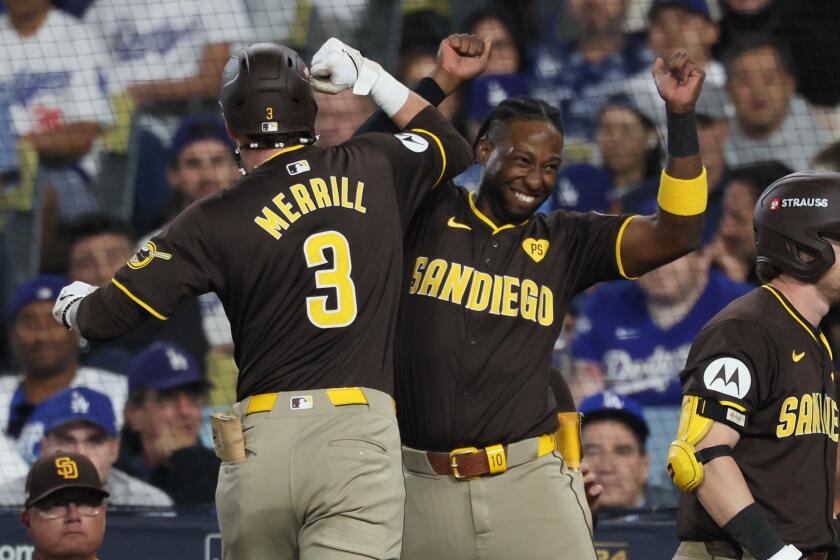Staying on Stage Too Long Can Spoil the Greatest Play
There’s a sadness to it all, except that sometimes the sadness is tinged with joy, perhaps because our hero is still our hero, calling his own shot, even the last shot, which is when to call it all off.
Most don’t, and emotions collide because we want our heroes to stay heroes and cringe when they are suddenly unheroic.
We want Jim Brown, leading the NFL in rushing, then retiring to become an actor well before he was no longer a football player. We don’t want John Unitas or Joe Namath, playing out the string.
We want Sandy Koufax, overpowering National League batters until he decided that some other things were more important, not Babe Ruth, batting an elderly, out-of-shape .181 in a strange uniform in a strange league; nor Steve Carlton, giving up eight earned runs in five innings in his last game for a team that didn’t want him, in a game that no longer had any use for him.
We want Chris Evert, with pride more important than money, not 42-year-old Willie Mays in Shea Stadium, falling on his face and chasing his mistake in the outfield.
We want Rocky Marciano, winning, winning, never losing until there was no one left to beat, not Muhammad Ali, dyeing his graying hair black before going into the ring against Larry Holmes and being beaten, then finally, absolutely, losing to Trevor Berbick in a fight that perhaps hastened the onset of his Parkinson’s syndrome.
Some of our heroes go out on top.
“I got out before I ever had to be like so many guys I’ve seen--sitting hunched over on the bench, all scarred and banged up, watching some hot, young kid out there in their place,” Brown said upon making sure he’d never have to see himself doing just that.
Some go out before their time, because of injury, as did Larry Bird.
“I still dream about basketball,” he said six months into retirement because of back surgery. “Three or four times a week. Believe it or not, Magic is still in my dreams.”
And some stay on so long that they are heroes only in our memories.
“Athletes who go out on top are clearly the minority,” said Al Petipas, a sports psychologist at Springfield College in Massachusetts and co-author of “The Athlete’s Guide to Career Planning.”
They are special cases, such as Marciano, Brown, Koufax and Evert.
They were athletes on their own terms, and they left athletics on those terms when they found other challenges on the horizon, or when being the best was satisfying, and no longer being the best was unthinkable.
They leave as Michael Jordan left, finances in order, goals achieved, nothing left to prove. Six NBA championships. Five most-valuable-player awards. Acclaim beyond anyone’s wildest dreams. The definition of an NBA player.
When anything more can only diminish what has been done, and so many new challenges are there to be faced that have nothing to do with a ball and an arena.
“[Guys like Jordan] tend to go through the transition into retirement much easier,” Petipas said.
“Because so many athletes put all of their identity in athletics, in its strength and exclusivity, so many of them struggle with retirement and with the decision to retire. People who transition best are those who see themselves outside of athletics.”
They are who they are, not what they do.
They are athletes, but they are also the CEO of Michael Jordan Inc.
Golfer, even baseball player.
Father.
Businessman.
Actor.
Never everyman, but perhaps what everyman would like to be.
“According to research, people with a good sense of self have a better chance at successful retirement, and they have other options,” Petipas said.
They aren’t Ruth, once and later acclaimed baseball’s best, but in between a sideshow, when he hung around the game into his dotage.
Or Mays. Or Mickey Mantle. Or Unitas.
“When it’s time to quit, it’s time to quit,” Unitas said.
But he didn’t quit in time, playing until he was 40 and couldn’t play any more.
Except for Marciano, they aren’t any boxer you can name.
“Father Time caught up with me,” Ali said after he had lost to Berbick. “I’m finished. I’ve got to face the facts. For the first time I feel that I’m 40 years old.”
Better he had realized that when he was 35.
Or younger.
“We all go through it,” Petipas said. “The difference is that most people face this at 65, but an athlete has to face it at 25 or 30 or so, even with a gymnast at 16.”
Evert realized at 34 that she should have gotten out at 32.
“I felt like I was beating my head against the wall,” she told the St. Petersburg Times last year. “I wasn’t going to improve. I hit my stride, I peaked and the players were only getting better. I was struggling to stay even.”
And making $5 million a year.
“Yes, but that’s one of the reasons I retired,” she said. “I had that pride. I wasn’t going to retire ranked 100 and washed up and a real has-been. ‘Why is she out there?’ ‘Oh, for the money.’ ‘Well, doesn’t she have enough?’ ”
As the stakes increase, though, it gets harder to walk away. The athlete always sees more: more money, more games to win, more batting titles, rushing championships, scoring crowns.
And there are egos to be fed.
“It depends on if they are in the financial position to do the things that they want to do, and if they have accomplished their goals, which are subjective things,” Petipas said.
So subjective, the athlete is usually the last to know when it’s over.
Said comedian Jerry Seinfeld on announcing that he had had enough of his sitcom: “Always leave them wanting more.”
But in all too many cases, it’s the athlete who wants more.
Carlton saw conspiracies everywhere because baseball didn’t want him at 43, when he was released five times in two seasons and kept coming back for more, though his record over his final four seasons was 16-37.
He needed the money, having invested his faith and 10 years’ salary--about $10 million--in an agent who invested his money in dry holes, instead of oil wells; in Florida swampland that’s still Florida swampland.
So he played until he was told he couldn’t play, then refused to believe it.
“You train from the time you put on a jockstrap to be a fiery competitor, and now all of a sudden people are going to tell you to quit?” said Tim McCarver, who caught many of Carlton’s games.
Well, yes, because that’s how we want our heroes to go out. We want them to recognize it, as Brown did and Evert did.
And we want them to be able to say, as Koufax did:
“I don’t regret for one minute the 12 years I’ve spent in baseball. But I could regret one season too long.”
More to Read
Go beyond the scoreboard
Get the latest on L.A.'s teams in the daily Sports Report newsletter.
You may occasionally receive promotional content from the Los Angeles Times.










